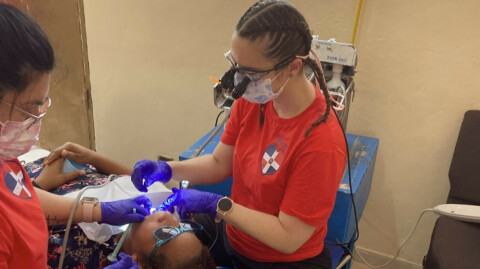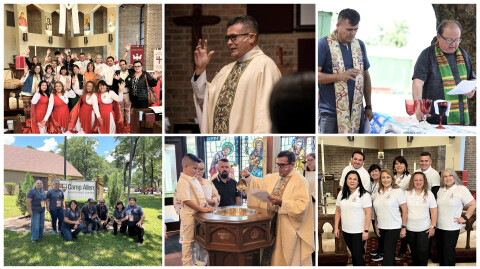TLDR: After a 12-year legal fight over property and trust funds, the remaining 14 congregations in the TEC-Affiliated Diocese have chosen to join The Diocese of Texas pending Council’s approval.
The battle began many years before 2003, but many have forgotten the details. The Episcopal Church has been fighting from within itself regarding weighty issues since the 1950s, but the fights intensified beginning in the 1980s. A brief summary by an untrained historian would describe these issues the following way: a theological divide on a number of issues, deep differences regarding the ordination of women, and a cultural struggle regarding the place people with a homosexual identity should have within the Church.
Theological issues: Allow me to use big words here. Ecclesiology was a big issue during these decades. Simply put, folks wondered what the proper relationship between The Episcopal Church (TEC) should be with the rest of the Anglican Communion. This is an issue of authority: Were Provinces (national Churches) within Anglicanism to be interdependent (a communion of practice) to the point that a Province would be very mindful of how local decisions would impact the larger Church around the globe? Or should Provinces be completely independent, discerning what the Holy Spirit was calling each national Church to do, whether it fit within the overall Communion or not? Needless to say, the more conservative side pleaded for an inter-dependent worldwide communion (which was trending more conservative at the time,) while a progressive side advocated for more independence to act in accordance with local need and interest. The same basic differences were seen on issues like Catechism and Biblical education (what we teach,) Missiology (how we spread the Gospel,) Liturgy (how we celebrate the sacraments,) Orders (especially the ordination of women and people with a homosexual identity,) etc.
The Ordination of Women: This had been an issue of intense debate during the liturgical renewal movement of the 1960s and 1970s, but as dialogue stood by the end of the 1960s, it seemed as though the ordination of women would have to wait several more decades to become a reality. This all changed with the ordination of the Philadelphia Eleven on July 29, 1974, two years before the Episcopal National Convention was to debate the issue. Many considered this election illegal and “out-of-Communion,” but in 1976, the National Church proceeded to approve the ordination of women. This controversial decision was followed by the election of Barbara Harris as the first woman Bishop in the worldwide Anglican Communion in 1988. Both the Philadelphia Eleven and Harris ordinations intensified the great debate as to the biblical permissibility of the ordination of women in Anglicanism. Today, most Provinces around the world ordain women, but not all.
Gay Issues (Ordination, Equal Rights, Marriage): This has been a divisive topic for mainline Christianity for decades. It has led to separation of conservatives from progressives in most mainline denominations, including our own. Because these issues are so fresh in our minds, I don’t want to spend too much time here. Basically, the ordination of the first Gay Bishop in the Episcopal Church in 2003, led to a split between conservatives (Many of whom prefer to be called Anglicans) and more progressive Episcopalians. By the time this election took place, however, the Church had been fighting for almost 20 years over the ordination to the priesthood of people with a homosexual identity. The first ordination of an openly-gay man took place in 1989, although there is evidence that several practicing homosexual men and women had been discretely ordained in the late 1970’s in New York.
Now, this brings us to 2008. Several dioceses around the country began to officially separate from The Episcopal Church primarily over some of the issues mentioned above. Whereas courts around the nation sided with The Episcopal Church and gave them to legal rights to all assets, the legal fight in Fort Worth took 12-years and an expensive lawsuit (which made it all the way to United States Supreme Court) to resolve. Then Bishop Jack Iker, made it clear that the two main issues of contention were homosexuality and the ordination of women to the priesthood. Throughout the long legal fight over property, trust funds, religious artifacts, and even the legal right to names, the courts in Texas consistently voted in favor of the conservative churches who wanted to leave the Denomination. There were five churches whose disputes went all the way to the Texas Supreme Court, who voted in favor of the conservative side. The more progressive side (who at the time still retained the name Episcopal Diocese of Fort Worth) appealed to the United States Supreme Court, which refused to hear the case, referring it back to the Texas Supreme Court in early 2021. What this meant was that with the inclusion of the last five churches in dispute, the breakaway group took 62 congregations from the Diocese, over a hundred million dollars’ worth of physical assets, and many more millions in trust funds and religious artifacts. To make matters more dire for the loosing side, in April of 2021, a court gave the conservative side all rights to the name, The Episcopal Diocese of Fort Worth, which is associated with the Anglican Communion Network (ACNA) rather than The Episcopal Church. The remaining 14 congregations took on the name The Episcopal Church of North Texas.
Now, this brings us to a letter from Bishop Doyle received by all churches and wardens last week. In the letter our Bishop states, “In the fall of 2021, Bishop Scott Mayer, provisional bishop of The Episcopal Church in North Texas (ECNTX) called together a discernment group of clergy and lay leaders to begin the process of identifying and evaluating options for the future of the Episcopal Church in the 23 counties that make up that region. This group eventually concluded that exploring a relationship with The Episcopal Diocese of Texas (EDOT) made sense.”
Now, what does this mean? In short, it means that those 14 churches become part of our Diocese, which makes sense for several reasons: We are a wealthy Diocese with the infrastructure and resources to provide care, love, support, and leadership to our brothers and sisters who worship in those churches. The second reason is simple: They used to be part of our Diocese many years ago, before they formed a new Diocese. What this means is that this is a family reunion. The Bishop’s statement continues, “I, along with the leadership of EDOT, grieved in 2008, when Bishop Jack Iker led 62 parishes out of the Episcopal Church. We immediately reached out to The Church in North Texas (then called Fort Worth), and we have been a friend and ally of the remaining and missionary-minded group of Episcopalians in North Texas as they rebuilt. We invited their clergy to our clergy conferences, we opened Camp Allen to them, and we offered startup funds and other financial support as they needed.”
It is important to know several things: This reunion requires Council’s approval. The Diocese will schedule a Councill meeting soon and all clergy and lay delegates will vote to accept the Reunion Plan. I plan to vote in favor of it because I believe this is a great idea and the right thing for us to do. Second, the joining of these two groups does not result in any assimilation of debts. The churches are solvent and with the right support they are primed for growth. Third, the merging of dioceses will continue to take place around the country (A few years ago Quincy joined Chicago over the same types of issues.) This is the way the Church works. Finally, we are a mission-minded Diocese with an expressed intent to plant at least fifteen churches in the next five years. What this means is that we already have an infrastructure in place to welcome these congregations.
If you have any questions, please contact me or the Diocese. Now, let me leave with the same prayer with which our Bishop concluded his letter:
O God of unchangeable power and eternal light: Look favorably on your whole Church,
that wonderful and sacred mystery; by the effectual working of your providence, carry
out in tranquility the plan of salvation; let the whole world see and know that things
which were being cast down are being raised up, and things which had grown old are
being made new, and that all things are being brought to their perfection by him through
whom all things were made, your Son Jesus Christ our Lord; who lives and reigns with
you, in the unity of the Holy Spirit, one God, for ever and ever. Amen.
Blessings to all,
Fr. Roman+





